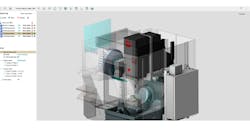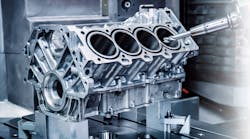Automation isn't a new concept. AMERICAN MACHINIST has been discussing the topic since its infancy. We're even in the Baby Boomer Edition of Trivia Pursuit ("What word, derived from the Greek for self-acting, first appeared in the August 21, 1948, issue of AMERICAN MACHINIST?") Since the forties, automation has found its way into manufacturing facilities in many forms. Yet, to many it still remains a concept rather than a reality.
A recent USA Today interview with Uwe Doerken, former executive chairman of DHL, got me thinking about the reality of automation and how it is essential to global competitiveness. DHL is the packaging company known for its yellow planes, trucks, and envelopes. A couple of years ago, it acquired Airborne to challenge UPS and FedEx in one of the world's hottest industries. And as you can guess, globalization was the objective.
Asked if outsourcing is good for the U.S. economy, Doerken responded, "Outsourcing first of all benefits the consumer. More efficient and less costly production leads to more affordable products and services and allows companies in higher-labor-cost economies like the U.S. and Europe to stay competitive and preserve their remaining jobs." He went on to say, "The U.S., as the leading economy of the world, must stay at the forefront of value creation to earn the higher salaries its people have come to expect. Outsourcing to lower-cost countries is one of the many tools to stay ahead. The highest valueadded jobs will always stay in the U.S. as long as we adapt and keep our businesses competitive."
Granted, many would argue his comments on outsourcing, but he's right about adapting our businesses to be competitive. The only way to compete in terms of cost and quality is through automated production. Furthermore, external forces like a continuing skilledlabor shortage, demands for a better working environment, and companywide computer-integrated manufacturing make automation a necessity.
If you doubt that automation is key to manufacturing success, let me share some words of wisdom from management guru Gary Hamel, spoken at the World Business Forum in Chicago. "Every business is a success — until it's not. And when it's not, it always comes as a surprise. The real challenge is not to stay efficient ... it's to stay relevant."
Just a little over 30 yr ago, numerical control (NC) machine tools were considered a radical advancement. Today, robotics, CAD/CAM software, and multitasking machines have allowed us to consider automation in terms of lights-out manufacturing. To further improve manufacturing efficiencies, automation companies such as Siemens and Rockwell have developed fieldbus technology with a range of compatible devices. Now, we can link machines to the Internet, allowing remote engineers to access them for control and diagnostics. If a bearing goes bad or the oil gets low, this technology lets the machine send an e-mail or trigger an alarm halfway around the world.
In the grand scheme of manufacturing, automation plays a key role. It is not only relevant but also necessary to compete in a global marketplace.





